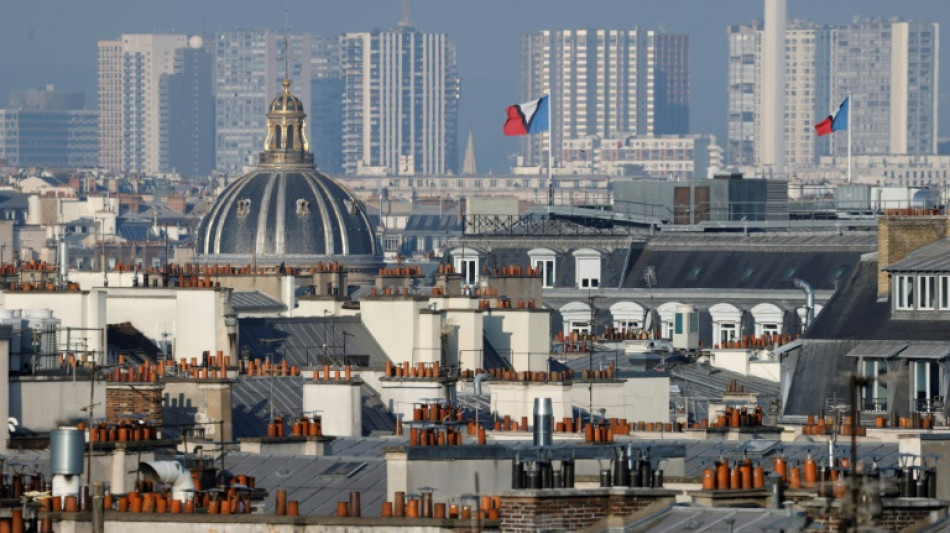
JRI
0.1800

As summer temperatures rise, many Parisians are warming to the idea of installing air conditioning in their apartments, ending a longstanding resistance to what is considered a basic comfort in many capitals elsewhere.
Although commonplace in the French capital's modern office buildings and large stores, air conditioning has never been the norm in Paris homes, where it is considered to be climate-unfriendly, wasteful and -- at least so far -- mostly unnecessary.
Complaints from foreign visitors mystified by Parisians' A/C rejection have usually been met with a Gallic shrug.
But fierce heatwaves in recent years, which experts say are exacerbated by global warming, are causing resolves to crumble -- though the newly converted often feel guilty about the environmental impact of operating an A/C unit.
"Even when you know that it's a selfish pleasure, there comes a tipping point at which all counter-arguments get thrown out," said Ruben Arnold, a 47-year-old father of young children.
As the boss of a startup company specialising in energy use in buildings, Arnold said he was well aware of the climate cost of air conditioning, but he needed the installation for him and his children to "get through" the heat.
For people on the top floor of Paris buildings directly under a zinc-covered roof, typical of the city's many Haussmann-era buildings, hot summers can feel like living below a frying pan.
- 'Didn't think that was even possible' -
"During the last heatwave, the temperature went up to 41C (106F) at my place," said Marion Lafuste, who lives in northeast Paris.
"I didn't think that was even possible."
Ice packs placed in front of fans and firmly closed shutters brought scant relief, the 40-year-old said.
Lafuste said she was lucky to have a place in the country where she and her family can sit out the worst of the heat. Otherwise she would have bought an A/C system "despite all the ideological problems I have with that".
Although she worries about global warming, "I no longer judge people who get one", she said.
Martine Bontemps, who also lives on the top floor of a Paris building, said she found the heat suffocating sometimes, but still "won't give in". Instead she makes do with a ceiling fan she got her landlord to install.
The national weather service Meteo France predicts that Paris could regularly see heatwaves of up to 50C by 2050.
There will also be a rising number of nights with tropical-like heat, it says, which poses a health problem because humans need to sleep in temperatures of under 20C to recover from daytime stresses.
During a virulent French heatwave in 2003, a third of the heat-related deaths of elderly people occurred at home.
This is why Sophie Julini, 53, installed air conditioning in her home, giving her 86-year-old mother an opportunity to cool down for several hours every day.
Air conditioning is not yet commonplace in Paris "but is in full development", according to a recent study by the APUR urban planning agency.
- 'Very problematic' -
Part of the pressure to upgrade comes from foreign visitors who rent private apartments, the report said.
Hard numbers are still difficult to come by, because many Paris dwellers buy portable units that do not appear in building statistics.
But overall, "we have observed a strong trend towards air conditioning", said Karine Bidart, director of the Paris Climate Agency (APC), calling the development "very problematic".
The agency, founded by city hall to help citizens with the climate transition, does what it can to counter this "catastrophic mis-adaptation" to climate change, she said.
"Several studies predict that a massive increase in private air conditioning will raise the outside temperature by 2C," said Dan Lert, in charge of the city's climate plan.
"It's one thing to use it as a last resort, especially for vulnerable people," said Frederic Delhommeau, director for residential energy at APC. "But it's problematic to turn to air conditioning as a reflex, because there are other solutions that are cheaper and more efficient."
Among them is the renovation of buildings, including by making changes to the many zinc-covered roofs, Lert said.
But often such projects are blocked by heritage protection agencies "who rate patrimony more highly than people's health", he said.
Despite everything, said Anne Ruas, a researcher, air conditioning in Paris's private apartments will only become more widespread in the coming years.
"Instead of saying you can't have them, and guilt-tripping people, we need to think of solutions and come up with the least harmful systems possible," she said.
C.Zeman--TPP